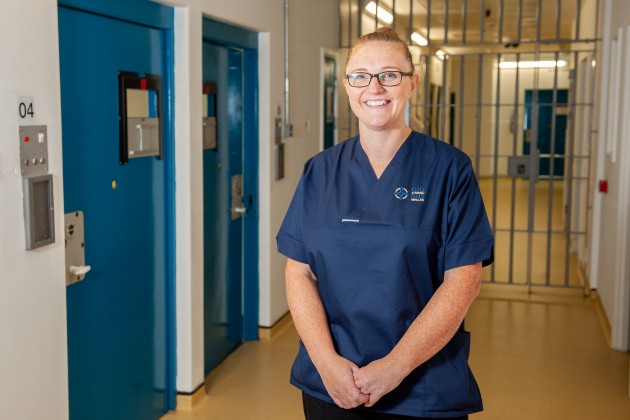“We’re caring for some of the most vulnerable and isolated people in society,” says Kirsty John, a nurse at HMP Cardiff, who’s working to eliminate hepatitis C among inmates.
Kirsty, formerly a prison officer, works hard to advocate for her patients. Last year, she was awarded RCN Wales Nurse of the Year 2021, in part for her efforts to provide COVID-19 testing for every person arriving in custody and setting up a vaccination hub within the prison.
Now she’s intent on implementing a rigorous Hepatitis Intensive Test and Treat (HITT) programme, with the aim of her prison becoming a micro-elimination site, following in the footsteps of HMP Swansea which was the first remand prison (where people are detained before trial) in the UK to achieve that status in 2019.
Hepatitis C is a virus that affects the liver and left untreated can cause serious and life-threatening damage. It often doesn’t have noticeable symptoms, or the symptoms are mistaken for other conditions, meaning many people have the infection without realising.
Unknown routes of transmission
The hepatitis C virus (HCV) is spread through blood-to-blood contact, with most infections happening in people who inject drugs or who’ve injected them in the past. But there are other routes of transmission which mean it can spread rapidly in prisons.
“Quite often people are shocked they’ve had a positive result and tell me they’ve never injected drugs before,” says Kirsty. “But the lesser-known ways of getting infected, through sharing razors, toothbrushes, hair clippers and other items, can be prevalent in a prison setting.”
Quite often people are shocked they’ve had a positive result
To eliminate the virus, widespread testing with fast access to results is vital. Though this been a challenge during the pandemic with COVID-19 testing taking priority, Kirsty’s ensuring that hep C testing picks up pace.
Now all prisoners coming into HMP Cardiff are tested upon arrival, with a mouth swab rapid result within 40 minutes. If prisoners get a positive result, they have an immediate one-to-one consultation so treatment can start straight away. Those who test negative or are antibody positive are enrolled on a regular testing scheme to ensure no undetected new infections fall through the net.
From then on, it’s about providing education and busting myths about hepatitis C, how it’s transmitted and treated. With modern medicines, it's usually possible to cure the infection, and most people with it will have a normal life expectancy, but often patients are concerned about the humiliation they might face and whether they’ll recover, Kirsty says.
“Previously, the treatment was likened to chemotherapy in how invasive and intense it was, which made a lot of people very worried,” she explains. “But times have changed. We now use direct acting antiviral medicines: a course of tablets which are 97% effective.”
Lasting benefits
The impact of education extends beyond the prison walls. For Kirsty, it’s about sharing knowledge with people so they complete their course of treatment and prioritise their health after release. The HITT programme provides an opportunity to stress the importance of long-term self-care.
We need to enable positive outcomes for patients and re-integration into society
“There’s such a fast turnover in our prison population that before we’d implemented HITT, patients were often back in the community by the time a positive hepatitis C result came back,” Kirsty explains. “We needed to do something because it’s difficult to follow up these cases. People become disillusioned or sometimes don’t have the information they need about the full effects of the virus.”
Within the prison, there’s a focus on preventing re-infection and providing emotional support to those who test positive. Kirsty organises visits from external specialists to give interactive talks and run workshops as well as sets up peer support through the Hepatitis C Trust.
“This opens up conversations, breaks down barriers and ensures patients have autonomy and understanding about their care,” she says.
As a former community substance misuse nurse, Kirsty has a deep understanding of addiction, and her connections with the community bloodborne virus team have helped maximise the impact of her work. She’s keen that people get the support they need once they leave prison, and importantly, continue their course of treatment.
“Tackling stigma is important,” she stresses. “We need to enable positive outcomes for patients and re-integration into society, rather than them reaching for coping mechanisms and cycles that may further harm their health and inhibit recovery and rehabilitation.”
The project has been made possible through excellent partnerships with Public Health Wales and specialist blood borne virus services, which obtained funding for it and continue to provide support. “This strong collaboration ensures the best possible continuity of care for patients and creates the holistic approach to prevention and cure that’s at the heart of our success,” adds Kirsty.
Hear Kirsty talk more about her role and nursing for RCN Nursing Matters special Nurses' Day 2022 podcast
Spot the symptoms
Hepatitis C often doesn’t have any noticeable symptoms until the liver has been significantly damaged. This means many people have the infection without realising it. When symptoms do occur, they can be mistaken for another condition.
Symptoms can include:
- flu-like symptoms, such as muscle aches and a high temperature
- feeling tired all the time
- loss of appetite
- stomach ache
- feeling and being sick.
The only way to know for certain if these symptoms are caused by hepatitis C is to get tested.
Could you be our next award-winning member?
Find out more about RCN Nurse of the Year Wales and other RCN Awards.








